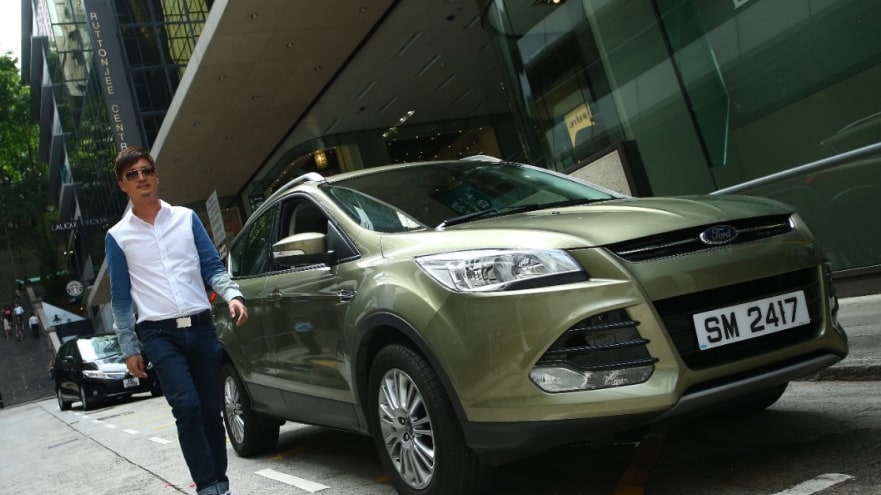- Ford is building on its longtime commitment to sustainable materials by sponsoring The EcoChic Design Award 2014/15 to raise awareness about protecting the environment
- Ten finalists of the competition will participate in a special design challenge to create statement fashions from textile waste and a selection of sustainable materials used in Ford vehicles
- Ford Kugas equipped with the fuel efficient Ford EcoBoost engines will transport VIPs
Hong Kong, China, June 3, 2014 – Building on its well established commitment to the use of sustainable materials, Ford Motor Company will sponsor the fifth annual EcoChic Design Award – a sustainable fashion design competition challenging emerging designers in Asia and Europe to create mainstream clothing with minimal textile waste.
The sustainable fashion design competition is organized by Redress, an established NGO dedicated to promoting environmental sustainability in the fashion industry by reducing textile waste, pollution as well as water and energy consumption.
Ford and Redress come together with a shared mission: to reduce waste, spread awareness about the sourcing and use of sustainable materials, and encourage individuals and businesses to keep sustainability at the heart of what they do, be it in the design and manufacture of vehicles or in fashion.
“We are delighted to work with Redress as the Gold Sponsor for this year’s competition,” said Pete Hardigan, director of Sustainability, Environment and Safety Engineering, Ford Asia Pacific. “Just as Redress works to put sustainability on the fashion industry agenda, Ford has been focused for years on ensuring we continually improve the sustainability of our vehicles and production methods while delivering great design and high levels of quality.”
The EcoChic Design Award competition is open to designers living in Hong Kong, Mainland China, Taiwan, Singapore, Malaysia, United Kingdom, France, Germany, Sweden and Denmark. The top thirty semi-finalists will be judged by an international panel of experts who then select ten finalists – one from each region. Each finalist will present their sustainable collection at the Hong Kong Fashion Week in January 2015. Following Fashion Week, a selection of the finalists’ designs will feature in an international exhibition.
Fords will sponsor an unprecedented challenge in this year’s competition: The 10 finalists will participate in a special Design Challenge in Hong Kong to create statement fashion designs from textile waste and a selection of the sustainable materials used in Ford vehicles. The challenge will be held in January 2015 in Hong Kong.
Ford also will provide Ford Kuga vehicles to transport VIPs participating in the event. As vehicles featuring sleek, sculpted lines, inside and out, as well as the fuel-saving EcoBoost engines, Kuga is indeed an appropriate eco- and fashion-friendly choice.
In China alone, it is estimated that approximately 20 million tonnes of textile waste is produced every year.[1] Over time, this waste transforms into greater stresses on our eco-system such as spikes in landfill overflow, water waste and CO2 emissions. These are all issues that The Ford Sustainability Blueprint addresses on all fronts, including the most environmentally conscious, hippest of fashion runways.
It is estimated that the designer influences 80 to 90 percent of the environmental and economic costs of a product.[2] That makes them the key to changing eco-trends in fashion. “And it’s never too late,” said Emily Lai, Color and Materials Design Manager, Ford Asia Pacific, “If given workable, or, even exciting new material and production options that are also economically viable, we can all make choices that reduce waste, encourage innovation and educate the next generation to go further.”
Sustainability at Ford
In 2001, Ford Motor Company established a dedicated team focused on the introduction of sustainable materials into Ford vehicles. Since that time, the team has been dedicated to introducing sustainable materials that also meet Ford’s stringent quality and performance standards across the global vehicle lineup. Today, Ford uses 41 fabrics with recycled content across 15 vehicle programs. The recycled and renewable materials Ford uses in its vehicles range from yarn made from PET water bottles, recycled felt, recycled denim, recycled pine fiber, and recycled TPE from tires to kenaf, wheat straw, soy bean oil and castor oil.
Sustainable materials are only one piece of Ford’s comprehensive approach to sustainability. Since 2000, Ford has decreased its total water use in vehicle production globally from 64 million cubic meters to 24 million cubic meters. Between 2011 and 2013, Ford has reduced the energy consumed in producing every vehicle by 21% throughout the Asia Pacific region. And Ford aims to cut waste-to-landfill by 40 percent – per vehicle between 2011 and 2016.
From building greener products to adopting cleaner operations, Ford continues to show a commitment to reducing its impact on the environment while supporting initiatives that significantly contribute to our world, for the better.
For more information about Ford and The EcoChic Design Award, please visit www.corporate.ford.com; www.ecochicdesignaward.com
Photo: Dorian Ho arrives at the EcoChic press conference in a Ford Kuga. Dorian Ho is an internationally renowned fashion designer based in Hong Kong. In 2001, he created his first ready-to-wear collection, which debuted at Mercedes Australian Fashion Week in Sydney and in New York’s Seventh and Sixth.
[1] China Association of Resource Comprehensive Utilization, 2013
[2] Graedel et al, 1995

